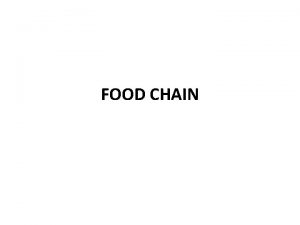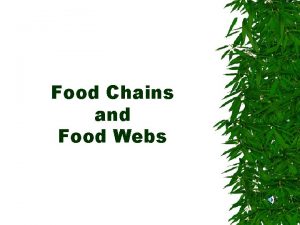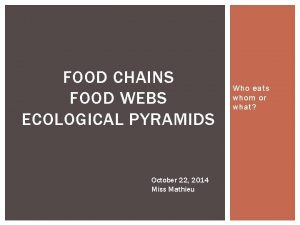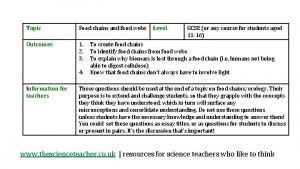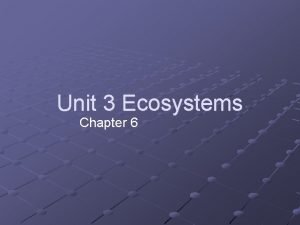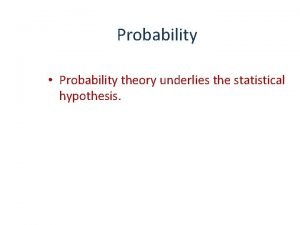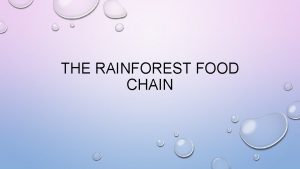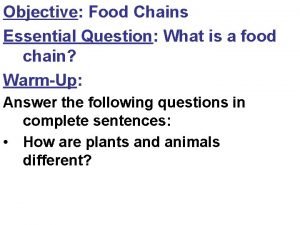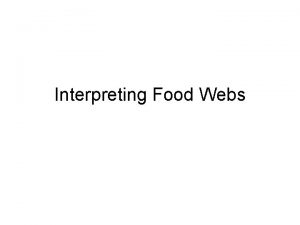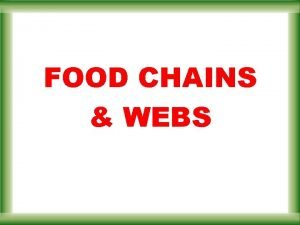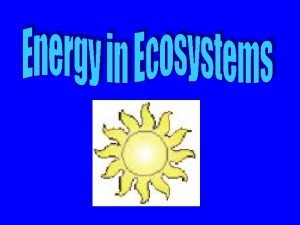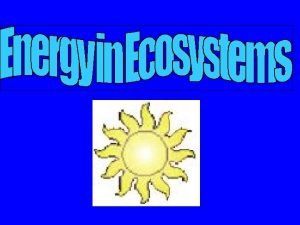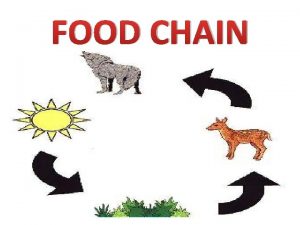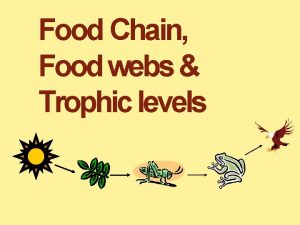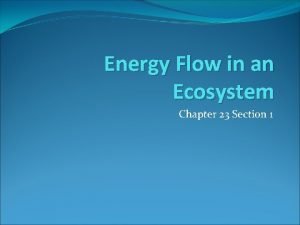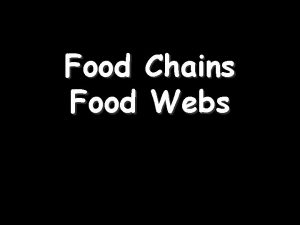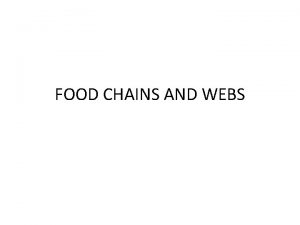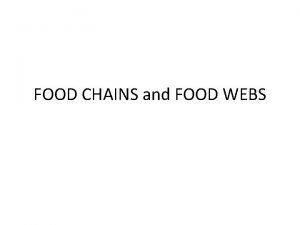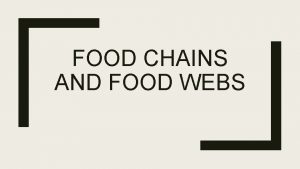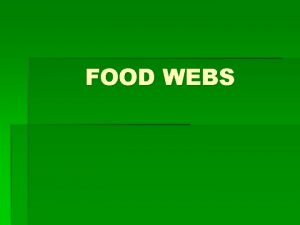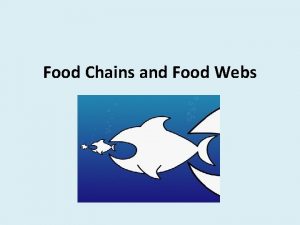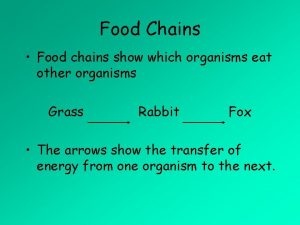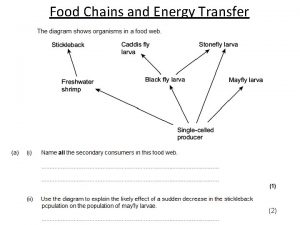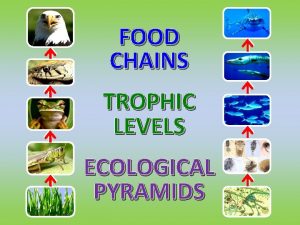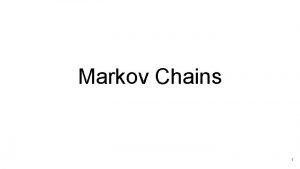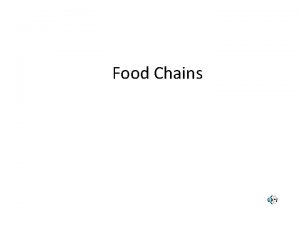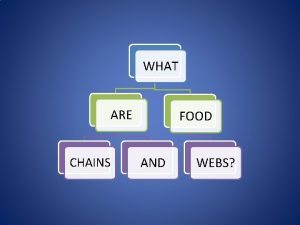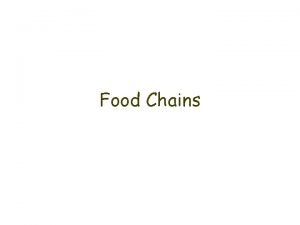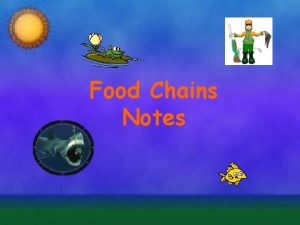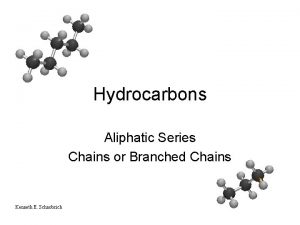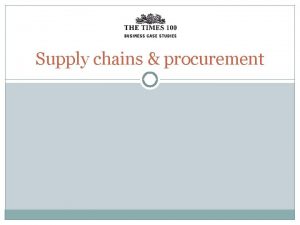Food Chains Food Chain A series of events





















- Slides: 21


Food Chains • Food Chain • A series of events in which one organism eats another and obtains energy. • What do food • Food chains show the transfer of chains show? energy in an ecosystem • What do the • The arrows represent the transfer arrows of energy. represent?

• All Food Chains start with the • What do sun food chains start with? • After the sun is an organism • What type of that can do photosynthesis. organism is after Like plants and phytoplankton. the sun? • Describe photosynthesis. • Sunlight + Carbon Dioxide + Water = Energy This process is called Photosynthesis

• Sample food • Sun →milkweed → aphid →ladybug chains: →bird → mushroom • Sun → grass → zebra → lion → vulture • Sun → seeds → grasshopper→ mouse → hawk



Video Clip

• Producers Flowers Phytoplankton • An organism that can make its own food. They use carbon dioxide, water and sunlight to make energy, through a process called photosynthesis. Producers are the source of all food in an ecosystem. Without producers there is no food chain. Tree

• Decomposers • Organisms that break down wastes and dead organisms and return the raw materials to the environment. • Two major groups of decomposers are: – Bacteria – Fungi. Decomposer Video Clip

• Consumers • An organism that obtains energy by feeding on other organisms. • Ex: Deer, Humans, Snakes, Bat, Cat, Hippopotamus, Cricket, Rabbit • 3 types of Consumers • Herbivores, Omnivores and Carnivores • Food Chain Game

• Sample food • Sun →milkweed → aphid →ladybug chains with producer 1 consumer 2 consumer energy roles →bird → mushroom labeled: 3 consumer Decomposer • Sun → grass → zebra → lion → vulture produce 1 consumer 2 consumer 3 con • Sun → seeds → grasshopper→ mouse → producer 1 consumer hawk 3 consumer Video Clip 2 /Prod/Cons Video 2 consumer

• 3 types of consumers • Carnivores • Herbivores, Carnivores, and Omnivores • Consumers that eat ONLY other consumers. ( Meat -Eaters) • Ex: T-rex, Tigers, Lions, Ladybugs, Spiders.

• Herbivores are consumers that eat only producers. (plant eaters) • Ex: Butterflies, deer, elephants, giraffes, mice.

• Omnivores • Consumers that eat BOTH consumers and producers. (both meat eaters and plant eaters) • Ex. Humans, Bearded Dragons, Turtles, Bears.

• Sample • Sun →milkweed → aphid →ladybug food producer 1 consumer 2 consumer chains herbivore Carnivore with →bird → mushroom energy 3 consumer Decomposer roles Omnivore labeled: • Sun → grass → zebra → lion → vulture produce 1 consumer 2 con 3 con herbivore carnivore

• Food Webs • A Food Webs consists of many overlapping food chains in an ecosystem. • It better represents the transfer of energy than a food chain.



• Energy Pyramid • An Energy Pyramid shows the amount of energy that moves from one feeding level to another in a food web. The most energy is at the producer level. At each level there is less available energy. • Energy Pyramid Video Clip


 Sequence of food chain
Sequence of food chain Producer in food chain
Producer in food chain Levels of nourishment in a food chain
Levels of nourishment in a food chain Food chains, food webs and ecological pyramids
Food chains, food webs and ecological pyramids Yellowstone food web answer key
Yellowstone food web answer key Desert ecosystem food web
Desert ecosystem food web How many food chains are there in the food web
How many food chains are there in the food web What is food web
What is food web Mutually exclusive vs non mutually exclusive
Mutually exclusive vs non mutually exclusive Anaconda food chain diagram
Anaconda food chain diagram Deer's food chain
Deer's food chain Food chain diagram
Food chain diagram What animal is at the top of the food chain
What animal is at the top of the food chain Antartic food web
Antartic food web Energy pyramid food chain
Energy pyramid food chain Food chain ladybug
Food chain ladybug Are snakes secondary consumers
Are snakes secondary consumers Omnivore tertiary consumer
Omnivore tertiary consumer Lions
Lions Significance of food chain
Significance of food chain Importance of food chains
Importance of food chains Second level consumer
Second level consumer
